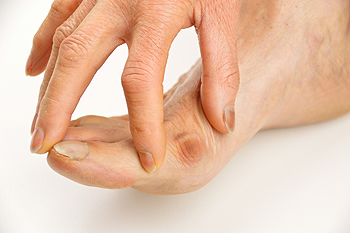(517) 487-5171
Fax (517) 908-0172
How Do Bunions Form?
Tuesday, 19 October 2021 00:00 Bunions can develop when the joint at the big toe is pulled out of alignment and the toe gets turned towards the rest of the toes. This is a very common issue, and it can result in a painful and bony lump to form at the joint. As bunions develop, they can get more and more painful. They will eventually push the other toes out of alignment which will lead to skin irritation and difficulty wearing shoes or walking. Common causes of bunions can include heredity, shoes that fit too tightly, arthritis, injuries, and nerve damage. Patients who are struggling with a painful bunion should consult with a podiatrist for proper treatment and pain relief methods. Common methods for treating bunions include wearing shoes with wide toe boxes, orthotics, and in some cases, surgery.
Bunions can develop when the joint at the big toe is pulled out of alignment and the toe gets turned towards the rest of the toes. This is a very common issue, and it can result in a painful and bony lump to form at the joint. As bunions develop, they can get more and more painful. They will eventually push the other toes out of alignment which will lead to skin irritation and difficulty wearing shoes or walking. Common causes of bunions can include heredity, shoes that fit too tightly, arthritis, injuries, and nerve damage. Patients who are struggling with a painful bunion should consult with a podiatrist for proper treatment and pain relief methods. Common methods for treating bunions include wearing shoes with wide toe boxes, orthotics, and in some cases, surgery.
If you are suffering from bunions, contact Dr. Gary Cesar of Michigan Foot and Ankle Center. Our doctor can provide the care you need to keep you pain-free and on your feet.
What Is a Bunion?
A bunion is formed of swollen tissue or an enlargement of boney growth, usually located at the base joint of the toe that connects to the foot. The swelling occurs due to the bones in the big toe shifting inward, which impacts the other toes of the foot. This causes the area around the base of the big toe to become inflamed and painful.
Why Do Bunions Form?
Genetics – Susceptibility to bunions are often hereditary
Stress on the feet – Poorly fitted and uncomfortable footwear that places stress on feet, such as heels, can worsen existing bunions
How Are Bunions Diagnosed?
Doctors often perform two tests – blood tests and x-rays – when trying to diagnose bunions, especially in the early stages of development. Blood tests help determine if the foot pain is being caused by something else, such as arthritis, while x-rays provide a clear picture of your bone structure to your doctor.
How Are Bunions Treated?
- Refrain from wearing heels or similar shoes that cause discomfort
- Select wider shoes that can provide more comfort and reduce pain
- Anti-inflammatory and pain management drugs
- Orthotics or foot inserts
- Surgery
If you have any questions, please feel free to contact our offices located in Lansing and Mt. Pleasant, MI . We offer the newest diagnostic and treatment technologies for all your foot care needs.








